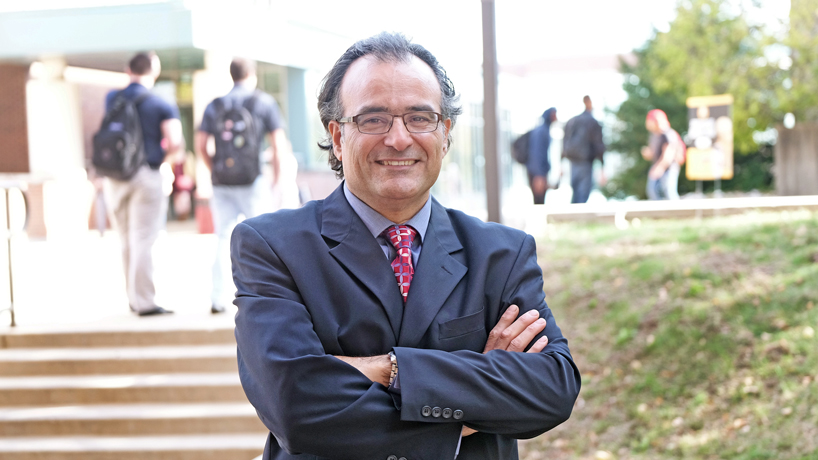
Economics Professor Sel Dibooglu will present research he’s done with colleagues from Turkey and Kazakhstan on forecasting bank defaults during the International Congress of Management, Economy and Policy next weekend in Istanbul. (Photo by August Jennewein)
Sel Dibooglu will spend part of his Thanksgiving break back in the country where he was raised.
The Turkish-born professor of economics at the University of Missouri–St. Louis is scheduled to give a keynote address at the inaugural International Congress of Management, Economy and Policy Nov. 26 and 27 in Istanbul, Turkey.
UMSL is joining with Turkish schools Namik Kemal University and Bandirma Onyedi Eylül University to put on the conference, which will feature 25 workshops and 136 speakers over two days at the Hilton Istanbul Kozyatagi in the city that connects Europe and Asia.
Dibooglu will present research he’s done with colleagues in Turkey and Kazakhstan on forecasting bank defaults.
“The global financial crisis brought under scrutiny the risk management practices and the models that are used to forecast default,” Dibooglu said. “Conventional measures have failed to ensure the financial system’s stability, so we need rival measures of default probabilities and default risk estimates.”
Dibooglu joined forces with Emrah Cevik, a professor at Namik Kemal, and Turaly Kenc, the former deputy governor of the Central Bank of Turkey and now a professor at Nazarbayev University in Kazakhstan, in 2014 to see if they could create a better model that could help investors, policymakers and regulators recognize rising default risk earlier so they would be better prepared and could take action to prevent it.
They recognized a weakness in the KMV model, derived from the work of economist Robert C. Merton, that has long been the industry standard for gauging risk. Namely, that model doesn’t account for the changing volatility in the market.
Dibooglu said the main reason for that has been the challenge to measure volatility numerically, but he and his colleagues believe they have found a way around that.
They borrowed an equation developed by Thomas Mazzoni, a professor of economics at the University of Greifswald in Germany, to calculate option valuation in derivative markets and discovered it could be used to approximate the volatility clustering observed during the global financial crisis.
“We adapted it to this framework and came up with an estimation technique,” Dibooglu said. “If we incorporate this change in volatility, we improve on the estimates.”
They tested their model and also found it has a better correlation with credit default swaps, a market-based measure of default risk. They are a particular type of swap designed to transfer the credit exposure of fixed income products among two or more parties.
“We get better results,” Dibooglu said, “not only in terms of the ability to forecast ahead of time, but in terms of the market-based measure.”
He and his colleagues recently finished the first draft of a paper detailing their findings, and Dibooglu is excited for the opportunity the conference will give him to share them.
That is not the only reason he is looking forward to returning to Turkey. He also sees it as a chance to expand UMSL’s reach, and he plans to pack a stack of brochures with him for the trip.
“The internationalization of our campus is a priority for us,” he said. “I am doing my best to spread the word about what we do and invite scholars and be invited and exchange ideas and raise the profile of our university.”
He takes those things seriously as someone who has made international economics, international finance and international trade the focus of his work and who has also traveled a long path to St. Louis.
Dibooglu grew up near the ancient city of Antioch on Turkey’s Mediterranean Coast, and after getting his undergraduate and master’s degrees in economics in Turkey, he came to the United States and earned his PhD in economics from Iowa State University in 1993.
He worked as a faculty member at Southern Illinois University in Carbondale for 10 years. Four of those were spent as a visiting professor at the University of Illinois in Champaign.
Dibooglu came to UMSL as an associate professor in 2003 and was promoted to full professor in 2007.
He’s been visible globally since, collaborating with colleagues not only in Turkey and Kazakhstan but also in the Czech Republic. He’s been invited to speak at conferences in Slovakia and South Korea, and next month, not long after returning from Turkey, he will head to Jiangxi University of Finance and Economics in Nanchang, China.
In addition to next week’s conference, Dibooglu has also joined the editorial board of the newly formed Journal of Emerging Economies and Policy, an annual peer-reviewed international journal committed to publishing empirical or theoretical articles in economics, business administration, political science and other related fields.















